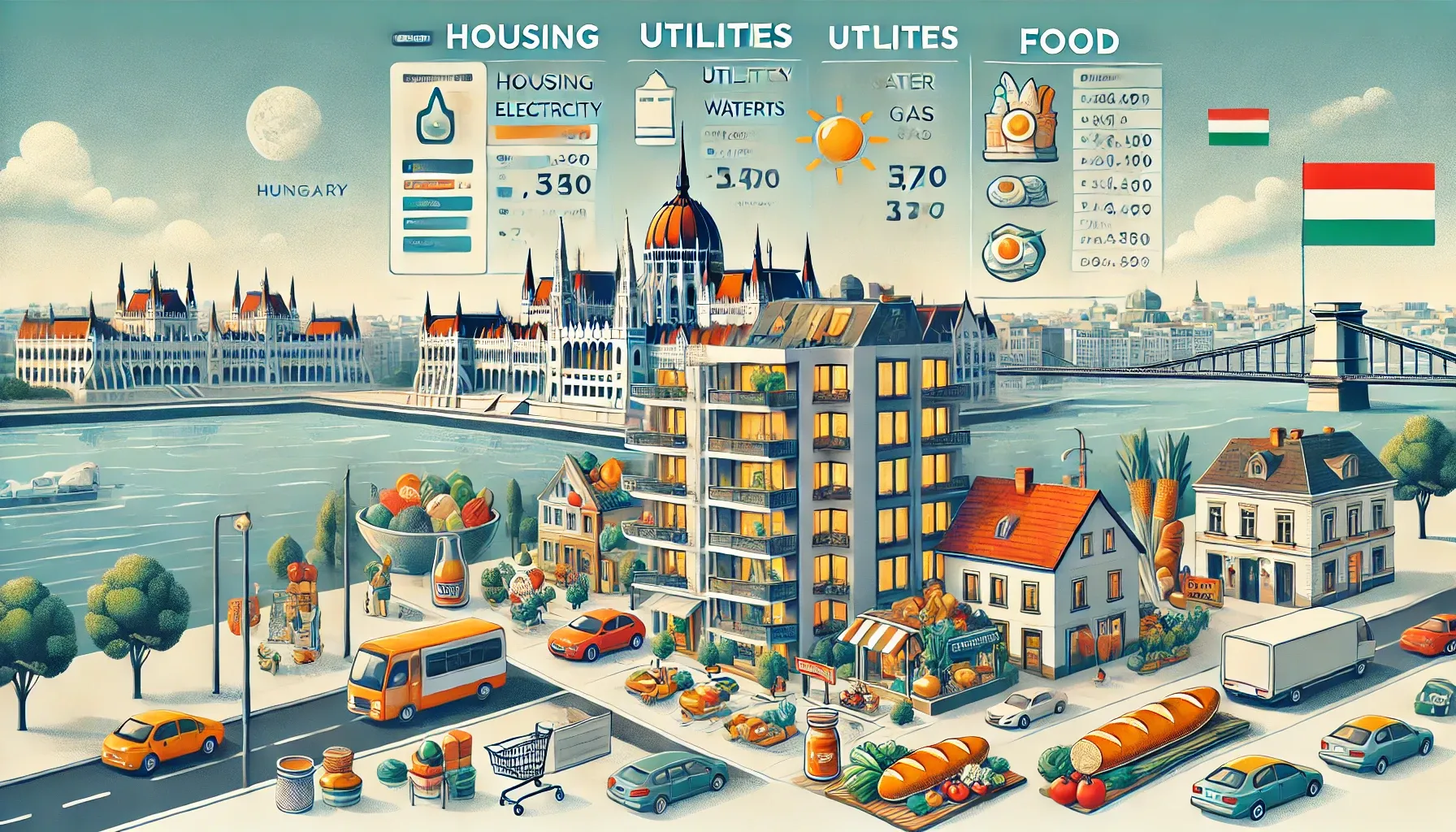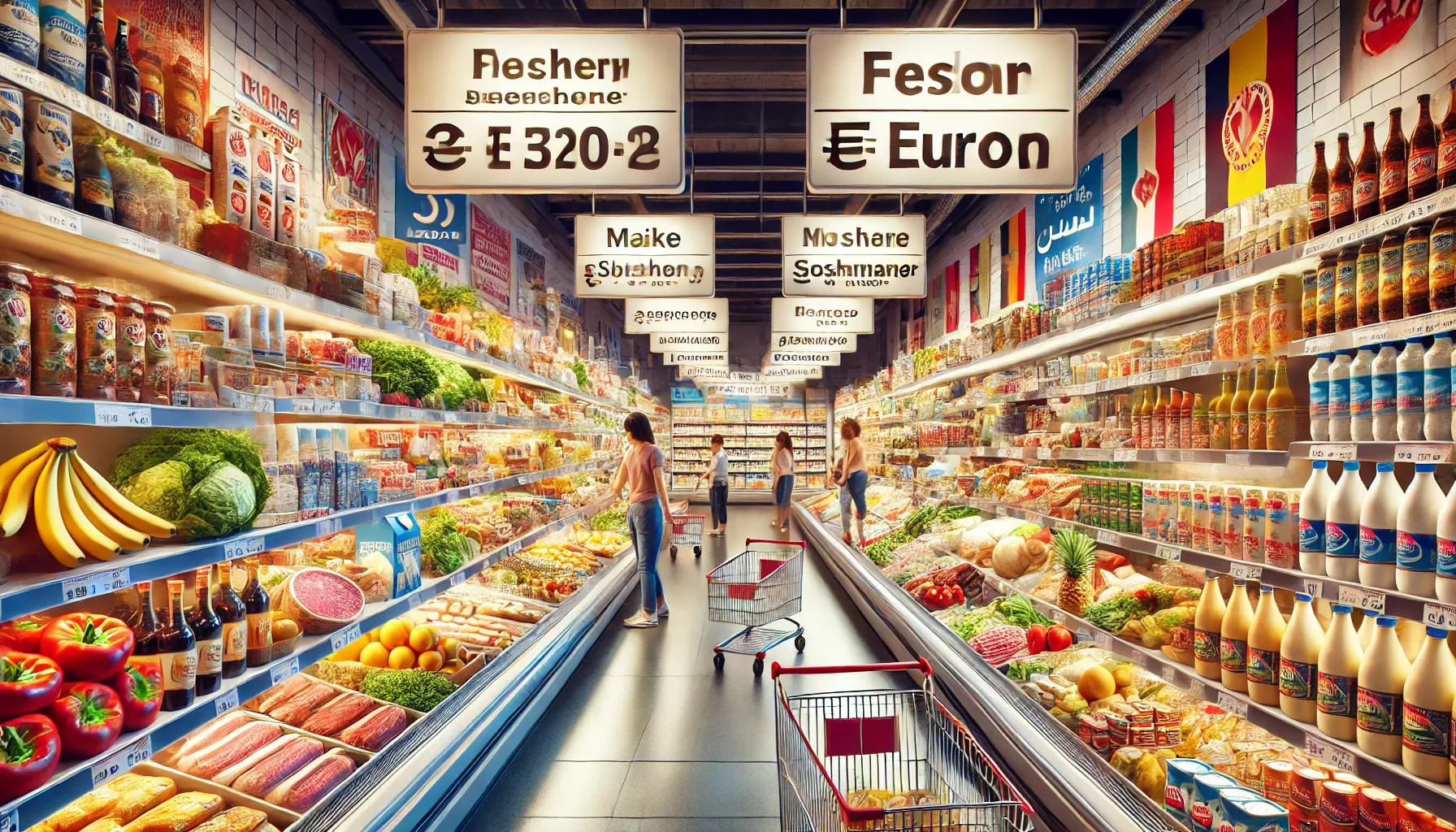Living expenses in Hungary: housing, groceries, food

- Housing in Hungary: Options and Expenses
- Hungary - prices for groceries and restaurants
- Shopping in Hungary: where and how
- Transport in Hungary: Travel and Opportunities
Acquiring property in Hungary
Purchasing property in Hungary can be a significant investment, considering the price differences depending on the location of the property. For example, the cost per square meter in the center of Budapest is noticeably different from that in its outskirts, while in Debrecen and Miskolc, you can find more affordable options.
Housing rental in Hungary
Renting accommodation also has its peculiarities in Hungary. For example, the prices for renting a one-bedroom apartment in the capital are higher than in other cities. However, overall, renting in this country is much cheaper than in many other European countries.
Utility payments and other expenses
Utility payments are significant living expenses. Various services such as heating, electricity, internet, garbage collection, maintenance by the management company, property insurance, and property taxes need to be included in the budget.
Total cost of accommodation
Overall, the cost of living in Hungary is quite affordable, especially in smaller towns where housing prices are lower and the quality of life remains high. Considering all financial aspects, you can find the best living option for yourself and your family in this beautiful country with a rich culture and history.
In Hungary, the cost of living varies, starting from €50 per month, and depends on the size of the accommodation and the amount of work. When it comes to grocery shopping, supermarkets play a key role. Notable ones include Spar, Tesco, Lidl, Penny, CBA, and Aldi. Prices in these stores are similar, but the difference lies in the selection of product brands. Hungarian food prices are not significantly different from Russian ones, and for some products, you can even find lower prices; for example, cheese, cottage cheese, and local wine.
Comparison of food prices in stores in Hungary
- Ham (100 g)- €0.6 – 1
- Salami (1 kg)- €6.8 – 7
- Chicken fillet (500 g)- €2.5 – 3.5
- Turkey fillet (450 g)- €2.7 – 3
- And others...
Fast food and food courts offer affordable dining options outside the home. Local fast food dishes, like kürtőskalács, can be purchased for as little as €2. A snack at restaurants like McDonald's will cost from €3. Large shopping centers have food courts where you can fill up for €2.5 – 3, for example, with duck and rice. Even chicken with rice will be even cheaper – just €2. If you decide to wash down your meal with a cup of coffee, it will add only €1, and a glass of beer will cost €1.5.
Diversity and atmosphere of restaurants
Restaurants in Hungary delight with their variety and delicious offerings at quite affordable prices. In major cities, you can visit Trofea Grill, where you only pay for entry and then can eat as much as you want. This will cost between €12 and €18 depending on the time and day of the week. The price includes not only food but also drinks. In more traditional restaurants, a meal for one person can cost around €10. For example, fish soup or goulash will cost approximately €4 to €7 depending on the portion and establishment. For a set menu, including goulash, dessert, and a glass of wine, you will need to pay €10 to €15.
In addition to nutrition, clothing and footwear also play an important role in everyday life.

**Unique opportunities in Hungary**
Hungary is one of the most economically accessible places in Central Europe for shopping. It offers a wide selection of goods and brands, but for a more exciting experience, you might want to look at its neighbors - Austria and Romania.
**Interesting places for shopping**
Even if the prices for expensive brands on Andrássy Avenue or Váci Street are higher than in other places, it's worth visiting the Premium Outlet Center outside the city to find quality Chinese goods at great prices.
**Shopping centers and markets**
Arena Plaza, located near the Keleti railway station, offers a wide range of services and products from supermarkets to cinemas.
9 October 2024
29 January
9 October 2024
29 September
**Prices and Discounts**
The average price for clothing and footwear is quite reasonable: €60 for Levis jeans, €30 for a dress from Zara or H&M, and between €75 to €90 for a pair of quality sneakers or leather shoes.
Those looking to save are advised to visit sales: from August to October and from February to March, discounts reach 70-80%, making shopping even more appealing.
Public transport
Hungarian public transport is well-developed, with buses, trolleybuses, and trams in every city. In Budapest, there are also metro, cable cars, and cogwheel trains. Tickets can be purchased at special machines or kiosks.
Hungary: Diversity of Transport
Hungary offers a variety of transportation options for getting around. A 24-hour transport ticket costs €5, while a single trip ticket is €3.5. For long-term stays in the capital, the Budapest Card is available for 1, 2, or 3 days, allowing unlimited travel on various modes of transport, except for the funicular and cable car. You can also purchase a pass for a specific mode of transport or a single journey ticket.
Exotic modes of transportation
The cogwheel railway, known as "Tram Line No. 60," is an interesting way to get around the capital. Located near the Moszkvater metro station, it allows you to ascend Mount Szechenyi. Tickets for this mode of transport are available at the specified prices.
Sights and transportation
- Funicular: ascent to the fortress walls of Buda Castle for €4.2 – 7.
- Cable car: a ride to Mount Janos for approximately €6.
- Steamers: excursion transport on the Danube, Tisza, and Lake Balaton for about €7.
Taxi and car rental
To avoid high taxi fares, it is recommended to choose government service cars with yellow license plates and a sign that says "Taxi." The rates are fixed and displayed on the dashboard or window. The cost of getting in is around €0.7 – 1.5, per kilometer is €1 – 2.1, and per minute of waiting is €0.2 – 0.4.
Renting a car for a day will cost between €20 and €30. The roads in the country are good, with a speed limit of 50 km/h in the city and 130 km/h on the highway. The price of gasoline is €1.1 per liter. Purchasing your own car (for example, a Volkswagen Golf 1.4 or a Toyota Corolla 1.6L) will cost around €17,000.
Bicycles and pedestrian paths
Bicycles are popular in Hungary, with a well-developed infrastructure for cyclists. Bike paths are laid out throughout Budapest, with rental stations available. The prices are affordable: the first 30 minutes are free, a day costs €3.8, three months are €38, and an annual subscription is €145. A deposit of €190 is blocked for renting.
The country has over 11,000 km of marked hiking trails, including national routes. A well-known trail is the Blue Trail, which is 1,100 km long.
Mobile communication
Hungary supports three main mobile network operators: Vodafone, Telenor, and Magyar Telekom.
Conclusion on living expenses in Hungary
When calculating the budget for living in Hungary, it is important to consider many factors, including the cost of housing, rent and utilities, food, as well as local dining establishments and shops.
- Housing prices:The average cost per square meter of housing ranges from €1,000 to €1,600 in different parts of the country. In the capital, prices are higher: from €2,000 to €3,000 per square meter in the center of Budapest, while in other cities, they are significantly lower.
- Rental:The cost of one-bedroom apartments ranges from €150 to €360 depending on the location. In Budapest, prices start at €250 for a one-bedroom apartment in remote areas and go up to €500 in the city center.
- Utility payments:On average, it costs about €140 per month to maintain an apartment, including expenses for water, gas, electricity, and other services.
Food products and expenses
Food products in Hungarian stores cost about the same as in Russia, with some items even being cheaper.
- Prices for products (examples):
- Ham (100 g) - €0.6 - 1
- Chicken fillet (500 g) - €2.5 - 3.5
- Cottage cheese (450 g) - €0.9 - 1
- Milk (1 liter) - €0.6 - 0.7
- French baguette (110 g) - €0.4
Dining establishments in Hungary
The local cuisine in the restaurants features a variety of affordable dishes:
- Fast food and food courts:Fast food in Hungary is a budget-friendly dining option. The prices for dishes start at €2, for example, kurtoskalacs. In food courts, you can have a hearty meal for €2.5 to €3.
- Restaurants:In restaurants, you can enjoy local dishes such as goulash or fish soup, which cost between €4 and €7 per serving.
The cost of housing and living can vary significantly depending on the location, so it's important to thoroughly research the market and consider all expenses before moving to Hungary.
Comment
Popular Posts
9 October 2024
1485
9 October 2024
9938
29 September
366
Popular Offers

Subscribe to the newsletter from Hatamatata.com!
Subscribe to the newsletter from Hatamatata.com!
I agree to the processing of personal data and confidentiality rules of Hatamatata














